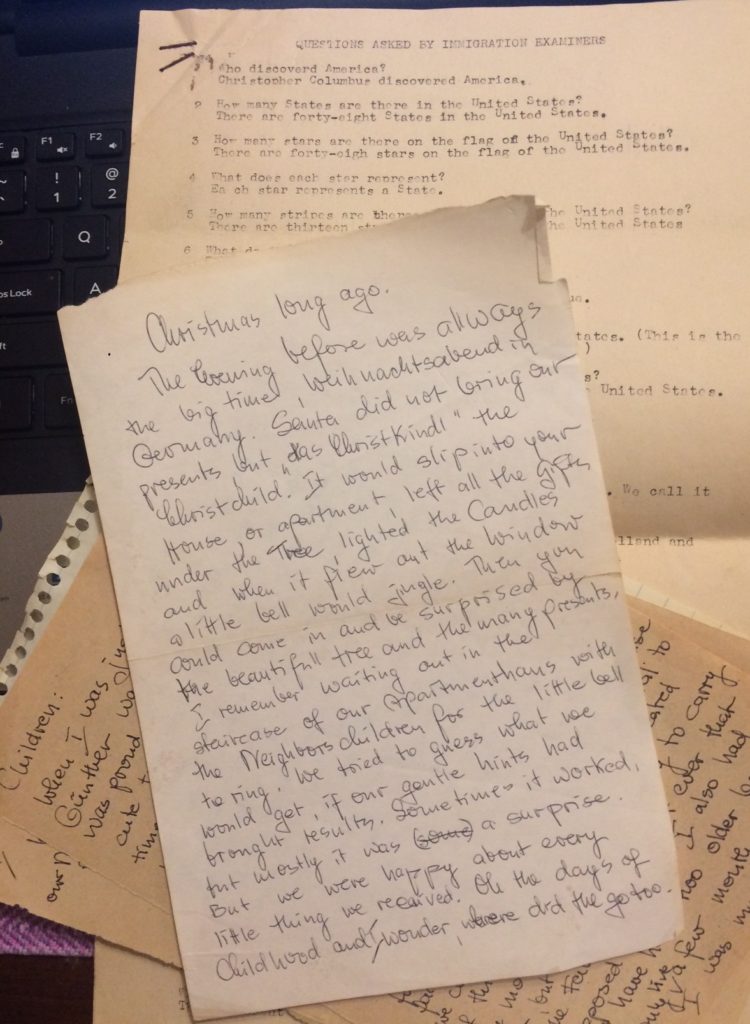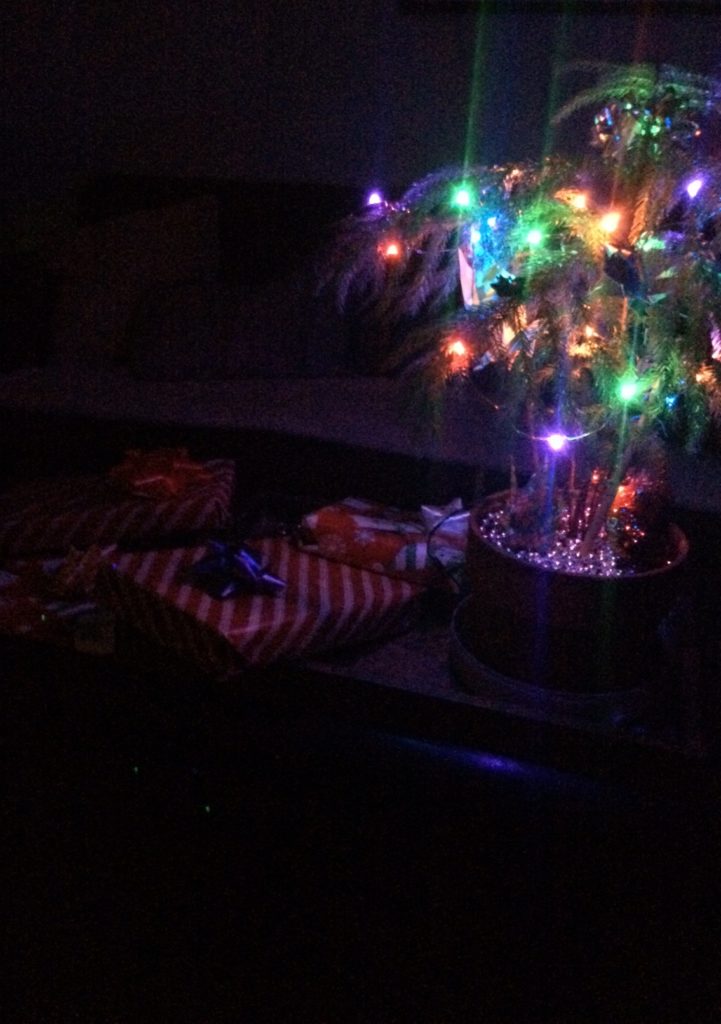Found among my mother’s papers
My sister came across this, while sorting through old files.
Christmas long ago.
The Evening before was always the big time, Weihnachtsabend in Germany. Santa did not bring our presents, but “das Christkindl,” the Christ Child. It would slip into your house or apartment, left all the gifts under the Tree, lighted the Candles, and when it flew out the window a little bell would jingle. Then you could come in and be surprised by the beautiful tree and the many presents.
I remember waiting out in the staircase of our Apartmenthaus with the Neighbor’s children for the little bell to ring. We tried to guess what we would get, if our gentle hints had brought results. Sometimes it worked, but mostly it was a surprise. But we were happy about every little thing we received Oh, the days of Childhood and I wonder, where did they go to.
I’ve corrected some spelling from the handwritten version, to prevent confusion, but I left the odd capitals — in German, all nouns are capitalized, and some of that impulse still moved my mother’s hand.
I have no idea what year my she wrote this down. Ingeborg Hilbig was born in 1927, so her childhood memories of Christmas in Germany probably refer to 1930 through about 1938. Her command of English is fairly good here, but other notes in the same file, from later in her life, show a much more sophisticated command of vocabulary and idiom. This might have been written as early a 1963, more than ten years after she and her husband and baby Sabine immigrated to the United States.
One thing that unexpectedly moved me — and it’s particularly a writer’s thing, I believe. It’s in that very last line.

It says, “Oh the days of Childhood and I wonder, where did they go to.” But look closely: that “I” is squeezed in there, between “and” and “wonder.”
It’s so clear to me that she originally wrote: “Oh the days of Childhood and wonder, where did they go to.” It’s a much better line.
But she didn’t trust her command of her new language, wasn’t certain about the turn of phrase, and she put that “I” in there to be safe. Mom, your first impulse was better! Don’t overthink your prose!
Sadly, she’s been gone many years now. So many stories she never told us…
And now it’s 2018, the actual, hardly-dreamed-of 21st Century.  I’m hoping your holidays are as sweet and memorable as my mother’s were.
As for me, I’m cooking up some turkey stew — always a happy event in our house! The little Christmas tree (incognito as a mere house plant the rest of the year) has new tiny LED lights that do not weigh its branches down.

Merriness!
Our best to you and everyone you love.
December 24th, 2018 at 7:05 pm
A lovely tribute to your mother, and a very sweet letter from here.
Here’s wishing for a better new year.
December 24th, 2018 at 7:15 pm
What a wonderful memory – thank you for sharing! Where in Germany did your family come from? “Christkindl” makes me guess Bavaria (where I happen to live).
Frohe Weihnachten, Rosemary!
December 24th, 2018 at 9:48 pm
Karan –
Nope, not even close!
My mother’s family came from Breslau (now callled Wroclaw and no longer in Germany but in Poland). After the war they were displaced and got moved to Laboe, not far from Kiel, in the north. Later, they moved to Hagen (in North Rhine-Westphalia). But I do have a cousin who lives in Munich!
December 28th, 2018 at 3:27 am
That’s really interesting, Rosemary! I had no idea that the diminutive “l” also occurred in that region. It is very common here in the south.
Have you ever explored the region where your family originated? I did it last summer (it was also an area that is in Poland now, but much further north), and it was ever so fascinating! 🙂
December 28th, 2018 at 5:50 am
Schlesian diminutive seems to be -el or -la, typically, so who knows.
The topic reminded me of this map though (the things you learn on the Internet):
https://brilliantmaps.com/poland-santa/
So even today and in Polish the “present-bringer” in the region is someone who translated into English is “Little Baby Jesus”. Which of course is literally what Christkindl means. Don’t think that’s just a coincidence.
January 20th, 2019 at 5:52 pm
Ah, I had wondered where she was from as well – though more because I found “Weihnachtsabend” a bit jarring. I expected to read “Heiligabend” (‘holy evening’), which is the word I’m used to. It’s clear what ‘Weihnachtsabend’ means, but perhaps bc ‘Weihnacht’ already contains ‘nacht’ (night), I find ‘Weih-Nachts-Abend’ weird.
And I remember the same, minus maybe the lighting of the candles. We had to leave the room, and at the tinkling of a bell were allowed back in and the Christkind had brought presents!
I hope you had a good Christmas, and wish you all the best for 2019! (I saw you had not-the-flu, I hope it leaves you soon and you can get back on track!)